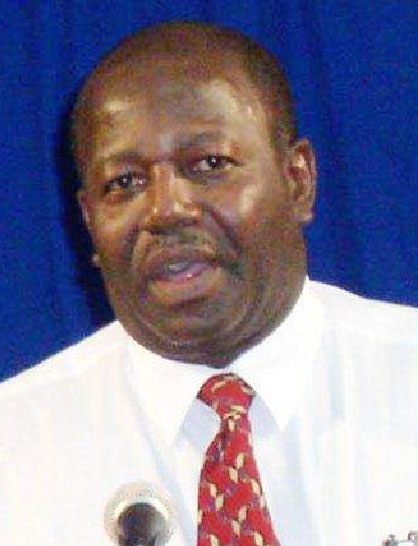It surprised me considerably that the turnout at the St. Sidwell’s Anglican Church Memorial Service for the late Courtney Gibson included few of his contemporaries; I wondered whether it was that news of the event might not have reached them up to that time; but then it occurred to me that we live in a society where word gets around and once I got to thinking that there was probably no good reason why news of the event did not get around the circuit of Courtney’s contemporaries, I begun to reflect on times past and how different it was ‘in those days.’
News of Courtney’s death had reached me via Bert Wilkinson. Bert is probably the youngest of that generation of journalists who now call themselves the ‘old hands.’ During the period between the death and the Memorial Service, Bert also kept me in the loop. He has a talent for such things. The last time I

had seen Courtney was as part of a gathering at Bert’s Laluni street home. The gathering had included the likes of Clayton Hinds, Lloyd Conway and Lindsay Davidson. Clayton, Lloyd and I had worked for the GIS and Lindsay had been a journalist working for the Chronicle.
It occurred to me while contemplating the absence of Courtney’s contemporaries from the memorial service that part of the reason would have had to do with the fact that many of them had themselves passed on… media practitioners like Shareef Khan, Clem David, Cecil Griffith, Michael Goring… all contemporaries of Courtney’s, though they may not all have worked for the same media house.
The passing of contemporaries has a funning way of nudging one in the direction of contemplating one’s own mortality. You do your best not to become too consumed with the idea though the reminders come thick and fast, like race cars whizzing by on a circuit.
Courtney’s death surprised those of us who knew him. You get to thinking that barring some unfortunate accident people like Courtney who lived what one might call ‘clean’ lives would live –even if not to what one might call a ripe old age – at least some distance beyond the sixty one years at which he died. There is an essential truth in the saying that man appoints and God disappoints.
All of us grew up in the era when the state media was dominant and when media freedom was an expression that we toyed with in an intellectual sort of way, knowing full well that the state frowned on real media freedom and that however creative you sought to be in expressing yourself, there was no shortage of media minders – both professional news editors and the political ones – who reminded you of what ‘government policy’ was, sometimes in ways that were quite blunt and brutal.
I believe that in those days there were journalists – and I believe that Courtney Gibson was one of them – who managed to retain a generous measure of self-respect while working for the state media particularly in those days when events like the Jonestown Tragedy and the death of Dr. Walter Rodney sent the media into a tailspin, raising the issue of media freedom again and again and laying bare the disposition of the political administration for ‘cover up.’
The various tributes paid to Courtney at the St. Sidwell’s Memorial Service were fitting ones. My recollection tells me that Courtney was a consummate and competent professional and that, simultaneously, he sought to retain the persona of a gentleman. By that I mean that he was polite and mild-mannered and never indulged in the kind of high-spirited revelry that has long been commonplace in the journalistic world. I do, however, challenge the view – and I verily believe that Courtney himself would side with me – that Mr. Gibson’s was an era of greater media freedom and greater professional stridency to protect that freedom. The 1970’s was a period when concepts like a New International Information Order was part of the media culture employed by the countries comprising the Non Aligned Movement to combat the western libertarian notion of media freedom. There was always a lack of real conviction to the idea that you could manipulate media freedom whichever way you choose to. The is what the New International Information Order boiled down to. Interestingly, the champions of the idea were leaders like Yugoslavia’s Tito, Cuba’s Fidel Castro and Iraq’s Sadaam Hussain. I recall as a young Foreign Service Officer attending a conference on information flows in Third World countries in North Korea. In those days Kim Il Sung was the resident ruler of that country. It would surprise me if Courtney Gibson would not, himself, have attended one or more of those fora.
We live in different times. The world has changed since Courtney and I and a host of others were youngsters chasing a dream. Our world on intellectualizing about free and unfree media was transformed by the end of the Cold War and the dictates of a new era that ushered in far more generous measures of media freedom. If there are those who still remain wary of the libertarian theory of media freedom – and the ill effects of that theory are clear for all to see – there is a general recognition that the New International Information Order was nothing more than a convenient contrivance designed to justify the distortion of truths. Perhaps not surprisingly, what we have discovered is that here in Guyana, as elsewhere, official proclivity for media control persists.
I recall seeing Terry Holder and George Baird at the Memorial Service. Both of them worked in the state media while Courtney Gibson did. Seeing them reminded me of a time when – by and large – levels of training and competence were – at least in my opinion – much higher than what they are today. Courtney was part of a generation of fine journalists and reporters that included the likes of Mohammed Hamaluddin, Lance Kandasammy, Claudette Earle and Rashid Osman. There were more but those that I have mentioned are those that came to mind.
A few of us actually toyed with the idea of paying some fitting tribute to Courtney though the idea sustained itself only briefly. I thought of the omission and concluded that it was not that all of us didn’t care for Courtney. Truth is, that these are different days. The fraternity that used to exist three or so decades ago has past and gone. These days, we care differently.
Arnon Adams









